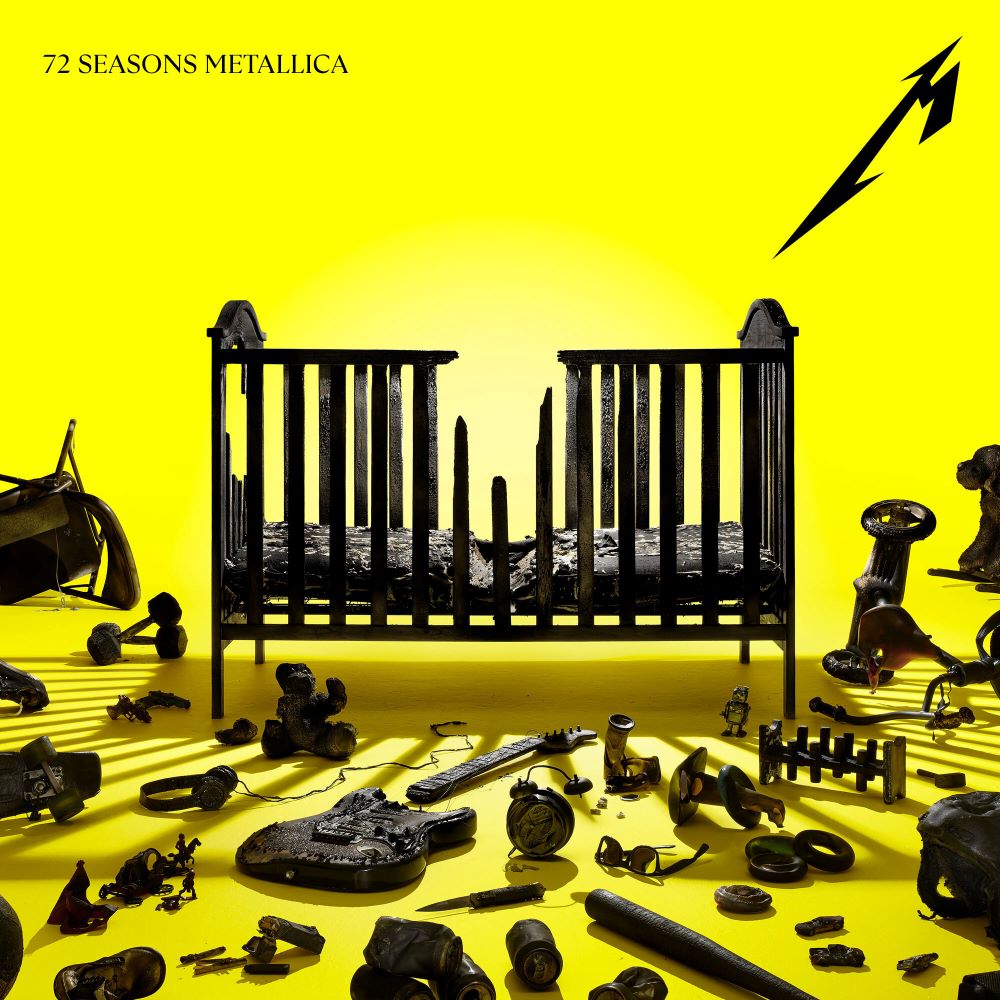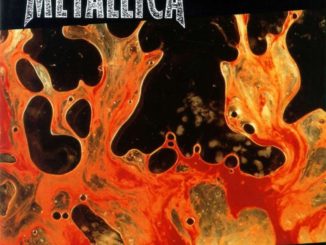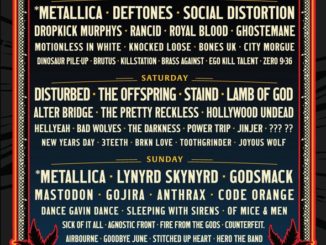
James Hetfield explains, “72 seasons. The first 18 years of our lives that form our true or false selves. The concept that we were told ‘who we are’ by our parents. A possible pigeonholing around what kind of personality we are.” He says, “I think the most interesting part of this is the continued study of those core beliefs and how it affects our perception of the world today. Much of our adult experience is reenactment or reaction to these childhood experiences. Prisoners of childhood or breaking free of those bondages we carry.” Childhood trauma is a subject Hetfield has explored since at least 1988’s “Dyers Eve.” His parents divorced when he was thirteen. His mother refused medical treatment due to her religious beliefs and died when he was sixteen. He
lived with his half-brother after his mother’s death. Certainly, that’s a lot to process. I am reminded that everyone is dealing with something difficult. In an April 11, 2023 interview with Metal Hammer, Hetfield shares that “Hanging onto the past hasn’t served me well, but changing the narrative of my childhood has been helpful. And that’s a lifelong process.”
The album opens with title track “72 Seasons.” It quickly launches into a thrashy burst that settles into a midtempo groove. With its extended structures, variety of sections, guitar soloing, and change of dynamics, it’s a definite restatement of a classic Metallica vision. “72 Seasons” extends beyond seven minutes, but they go by quickly. At slightly over six minutes, “Shadows Follow” is a more compact statement that cruises in the midtempo zone and moves into a good groove around the three-minute mark. One of Kirk Hammett’s solos pops in. “Screaming Suicide” shaves off yet another minute. Coming in a five-and-a-half minutes, it’s the second single from the album and has more of a commercial feel. Not bad, but I prefer the first two. With “Sleepwalk My Life Away” Metallica takes it up to almost seven minutes. It’s another midtempo groover but with somewhat more nuanced vocals. So far, the album’s structure seems to be midtempo songs with thrashier passages and moments here and there along with bursts of Hammett shredding.
The title of “You Must Burn!” suggests an angry thrasher. Instead, it grooves and stomps in a way reminiscent of “Sad but True” during its seven minutes. The chorus is catchy but not too catchy. Check out the spooky vocals a little after the four-minute mark. I’m a fan of this one. “Lux Æterna,” which translates as “eternal light,” begins as the fast track I expected “You Must Burn!” to be. Unfortunately, it comes off a tad generic. As the album’s shortest track at just a
little over three minutes, it feels almost like it was put in as a quick shot to pick up the album midway and put something fast on the album. “Crown of Barbed Wire” is okay. The chorus is a little weak. “Chasing Light” is a step up. The first third of 72 Seasons is better than the second third.
The chugging “If Darkness Had a Son” is a highlight. The chorus is very strong. The six and half minutes pass by quickly. “Too Far Gone?” is the album’s second-shortest song. At times, it feels likes it wants to break out and speed up, but never does. For example, listen to the guitar line at the 1:20-1:25, 2:20-2:25, and 4:00-4:05 marks. In “Room of Mirrors” Hetfield sings about opening himself up and wondering what other might think: “Would you criticize, scrutinize, my pain / Would you summarize, patronize, classify insane?” It’s five and a half minutes of introspection. Album closer “Inamorata” (“female lover”) is an eleven-minute-plus journey that isn’t quite a ballad. Hetfield sings of being used by a lover, seeing her for what she is, and finally leaving her behind. Given Hetfield’s long-documented substance abuse issues and return to rehab in 2019, one wonders if this might also be a vow to stay sober. As Metallica’s longest recorded song to date, there’s a lot to listen to here. Pay special attention from the passage from 5:21 to 5:52 which powers down and features just bass, cymbals, and a slow and mournful guitar line. Hetfield’s vocals come back in and that moody arrangement continues until about the 6:40
mark as the tracks regains its earlier tempo. This is the closest anything on 72 Seasons gets to sounding like a ballad.
A lot of the lyrics of 72 Seasons remind me of the early poetry I wrote in high school—honest and often abstract. I’ll leave it for readers to decide if that is critique, compliment, or simply comment. I’ve never quite understood the inverted syntax of many of Metallica’s lyrics. Why, for example on 72 Seasons, “So tight this crown of barbed wire” and “This rusted empire I own”? Sounds forced. I’m probably just quibbling. I don’t listen to Metallica for the poetry, and I don’t read Shakespeare for the electric guitars. In that same April 11, 2023 interview Hetfield explains, “You know, fast singing is not for deep, intense words” and “I love cadence, I love percussion, I love playing drums. The vocals are another part of that percussion.” The words should serve the music (not the other way around), prioritizing lyrics over music imposes certain guidelines for or restrictions on word choice, and his word selections can be based more on their
musical functions and sounds rather than their individual content, Hetfield suggests. Ultimately, the music is what matters most and that is definitely present on 72 Seasons.
If you feel Metallica died after . . .And Justice for All, 72 Seasons will not feel like a return to those glory days. If you feel Metallica peaked with Load and Reload, this probably isn’t for you, either. If you loved their pre-Metallica output, are okay with Metallica, believe Load and Reload are their nadir, were intrigued with St. Anger and Death Magnetic but find them uneven, and think Hardwired… to Self-Destruct is the best thing they’ve done since Justice or perhaps Metallica, then you should find 72 Seasons well worth listening to.



